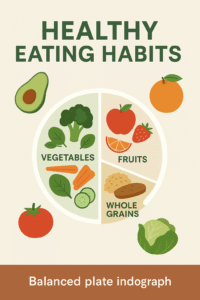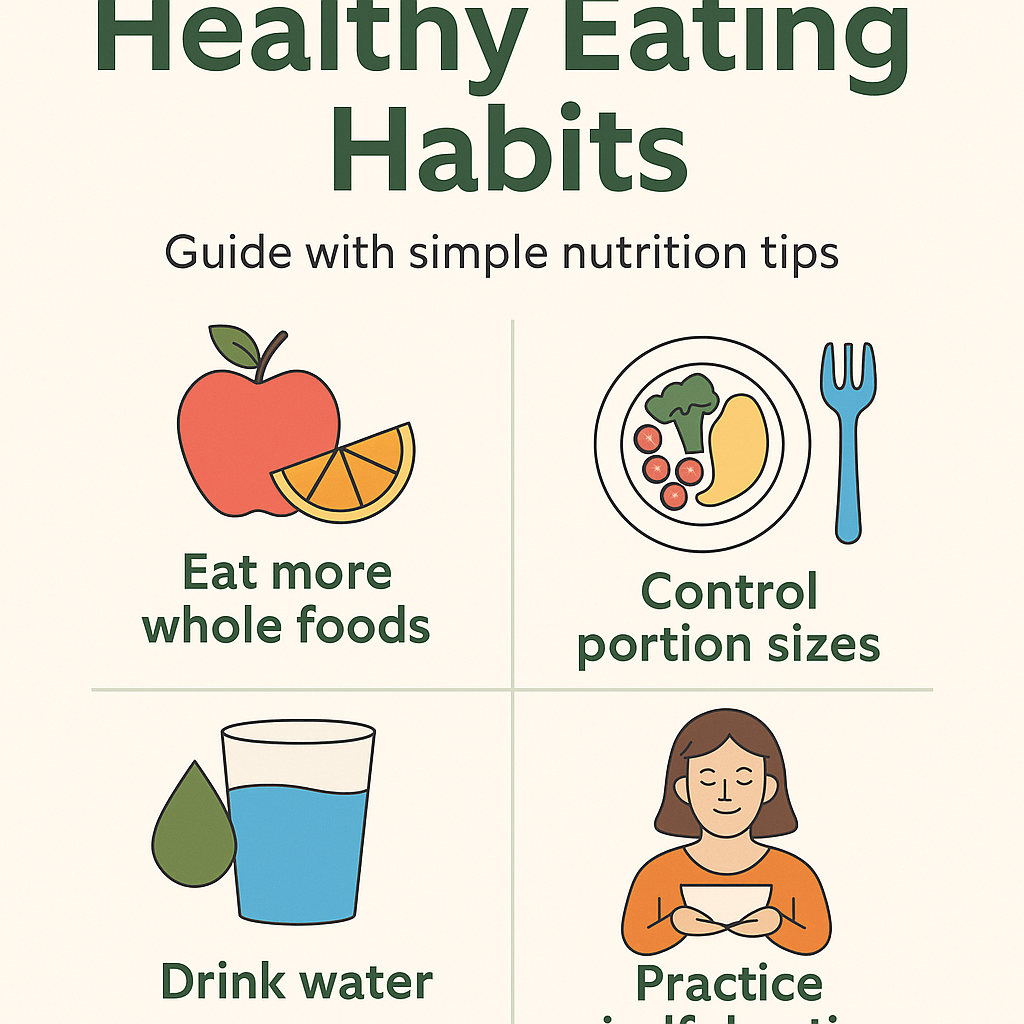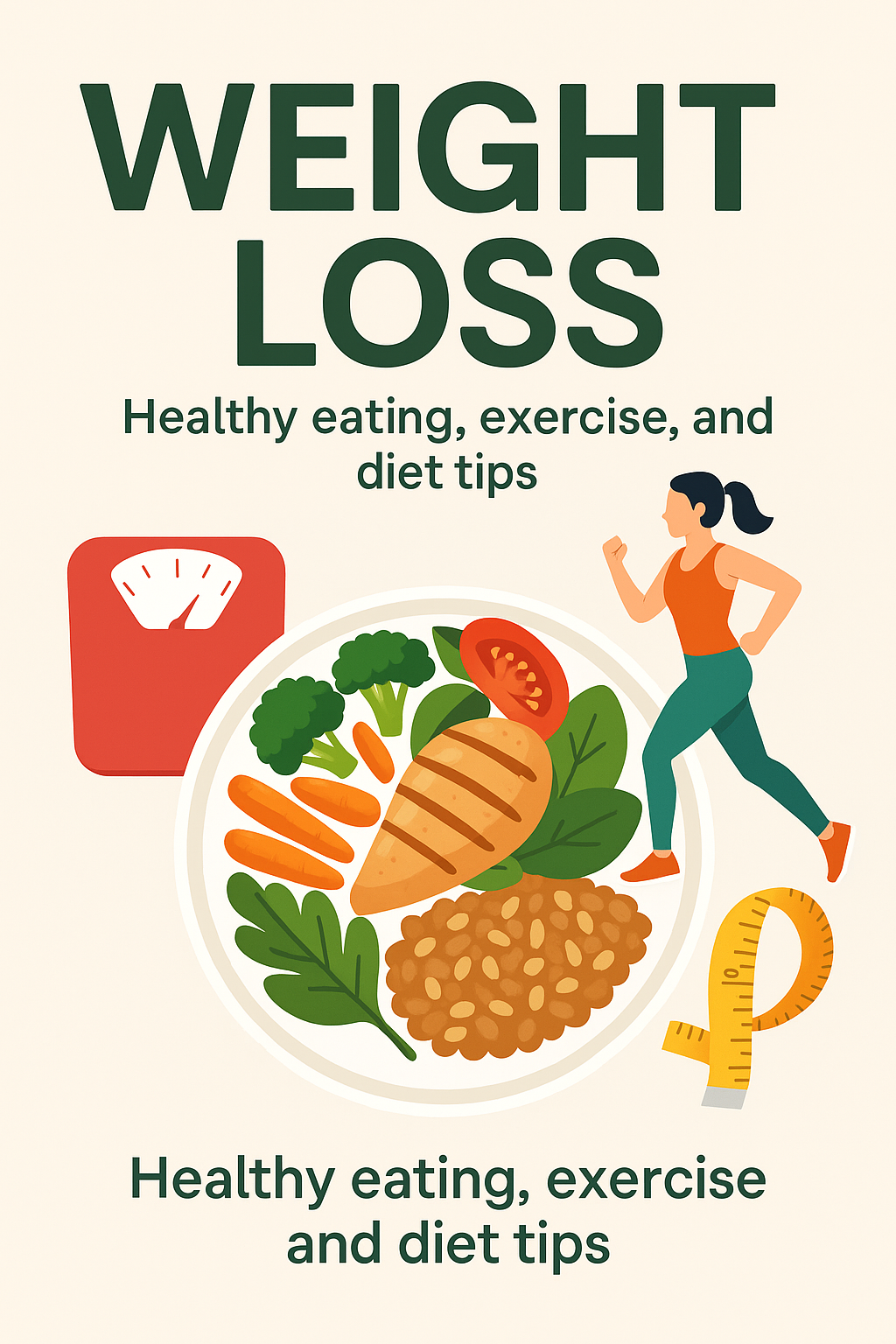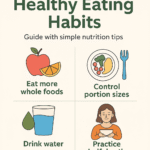In today’s fast-paced world, it’s easy to fall into the trap of eating fast food, skipping meals, or choosing convenience over nutrition. These patterns often lead to weight gain, low energy, and long-term health problems. Developing healthy eating habits is one of the most powerful steps you can take to improve your well-being, maintain a healthy weight, and feel energized throughout the day.
Unlike restrictive diets, building healthy eating habits focuses on small, sustainable lifestyle changes that last a lifetime. This guide will explore what healthy eating habits are, why they matter, and how you can adopt them into your daily life.
What Are Healthy Eating Habits?
Healthy eating habits are consistent practices that promote balance, moderation, and nutritional variety. They go beyond calorie counting and focus on making better food choices every day. This includes eating whole foods, controlling portion sizes, staying hydrated, and being mindful about what you eat.
In short, healthy eating habits are less about “what not to eat” and more about how to eat well consistently.
Benefits of Healthy Eating Habits
Adopting healthy eating habits offers benefits that go far beyond weight management:
-
Boosts Energy Levels – Nutritious meals fuel your body and prevent energy crashes.
-
Improves Digestion – Eating fiber-rich foods keeps your digestive system healthy.
-
Supports Weight Control – Balanced meals help you avoid overeating and junk food cravings.
-
Strengthens Immunity – Vitamins, minerals, and antioxidants protect your body from illness.
-
Enhances Mental Health – Studies link healthy eating habits with reduced stress and improved mood.
-
Promotes Longevity – Consistently eating well reduces the risk of chronic diseases.

10 Essential Healthy Eating Habits You Can Start Today
1. Eat More Whole Foods
Focus on fruits, vegetables, whole grains, nuts, and seeds. These foods are nutrient-dense and packed with fiber, vitamins, and minerals.
2. Limit Processed Foods
Processed foods are often high in sugar, sodium, and unhealthy fats. Replace them with natural alternatives whenever possible.
3. Control Portion Sizes
Eating large portions—even of healthy foods—can lead to weight gain. Practice portion control by using smaller plates and being mindful of hunger cues.
4. Stay Hydrated
Water plays a key role in digestion, energy, and metabolism. Aim to drink at least 8 glasses of water daily.
5. Include Lean Proteins
Choose chicken, fish, eggs, beans, and lentils over fried or processed meats to build muscle and stay full longer.
6. Don’t Skip Breakfast
Breakfast jump-starts your metabolism and prevents overeating later in the day. A healthy breakfast might include oats, fruit, and a protein source.
7. Practice Mindful Eating
Instead of eating while distracted, eat slowly and focus on your meal. (See also: https://empowerfitusa.com/mindful-eating-techniques).
8. Plan Your Meals Ahead
Meal planning prevents last-minute unhealthy food choices and helps maintain consistency.
9. Limit Sugary Drinks
Replace soda and energy drinks with water, herbal teas, or smoothies made from natural fruits.
10. Add Variety to Your Diet
Eating the same foods daily can limit nutrients. Rotate your meals to include different fruits, vegetables, and proteins.

Practical Tips to Build Healthy Eating Habits
-
Start Small: Change one habit at a time instead of overhauling your entire diet.
-
Keep Healthy Snacks Handy: Replace chips with nuts, yogurt, or fruit.
-
Read Food Labels: Pay attention to sugar, sodium, and calorie content.
-
Cook at Home More Often: Home-cooked meals are healthier and cost-effective.
-
Use a Food Journal: Tracking meals (see: https://empowerfitusa.com/easy-anti-inflammatory-meals) helps you stay consistent.
Healthy Eating Habits vs. Dieting
People often confuse healthy eating with dieting, but they are very different:
-
Dieting focuses on restriction, temporary results, and strict rules.
-
Healthy eating habits focus on balance, moderation, and long-term sustainability.
If you’ve ever wondered why diets don’t work long term, read our guide on Why Diets Fail.
FAQs About Healthy Eating Habits
Q1: How long does it take to develop healthy eating habits?
Research suggests it can take about 2–3 months of consistent effort for habits to become natural.
Q2: Can I still enjoy my favorite foods?
Yes. Healthy eating habits are about balance, not elimination. Enjoy treats occasionally in moderation.
Q3: Do I need to follow a specific diet plan?
Not necessarily. Focus on whole foods, portion control, and consistency rather than restrictive diet plans.
Q4: Will healthy eating habits help me lose weight?
Yes, gradually. By eating nutritious foods and controlling portions, your body naturally maintains a healthy weight (see: Weight Loss Without Dieting).
Final Thoughts
Developing healthy eating habits is one of the best investments you can make for your health. Unlike quick diets, these habits last a lifetime and bring benefits like higher energy, better digestion, and improved overall well-being.
Start small, stay consistent, and remember that every healthy choice you make adds up over time. Pair your new habits with other positive lifestyle changes for maximum impact.
https://www.hsph.harvard.edu/nutritionsource/healthy-eating-plate/





